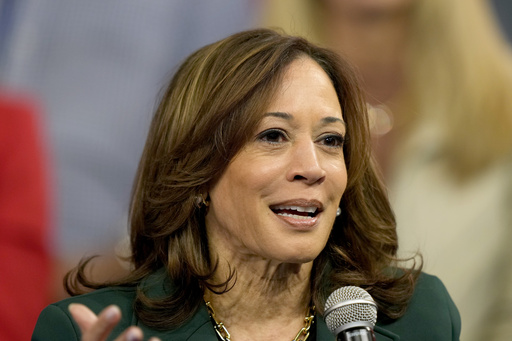
**Vice President Kamala Harris to Visit Texas Prior to Election Day to Address Reproductive Rights Issues**
Vice President Kamala Harris is scheduled to visit Texas, a state known for its strong Republican support, just ten days before the upcoming Election Day. This visit is part of an effort to shift her campaign focus back onto reproductive health care, a crucial issue for Democrats this electoral cycle, particularly in light of recent Supreme Court decisions.
During her time in Houston, Harris will engage with women impacted by Texas’s stringent abortion regulations, which were enacted after the Supreme Court’s ruling that overturned Roe v. Wade in 2022. Her visit follows her stop in Georgia, another state grappling with significant restrictions on abortion services.
In her campaign messaging, Harris has closely linked former President Donald Trump to these restrictive policies, pointing out that he nominated three conservative justices to the Supreme Court who played key roles in reversing Roe v. Wade. Campaign officials see Harris’s trip to Texas as an innovative strategy to draw attention amid the flood of typical campaign activities inundating battleground states.
“Texas serves as the backdrop for this event,” remarked senior campaign advisor David Plouffe, emphasizing that the main goal is to reach voters in battleground areas grappling with similar reproductive health issues.
Throughout her campaign speeches, Harris has shared heart-wrenching stories such as that of Amanda Zurawski, a Texan who suffered severe complications during pregnancy but was denied a necessary abortion because doctors determined she was not in immediate danger. Additionally, Harris mentioned Amber Thurman, a Georgia mother who tragically died after significant delays in medical care following the use of an abortion pill.
Recent Supreme Court actions have upheld that federal regulations cannot mandate Texas hospitals to provide abortion services in defiance of the state’s abortion laws. Plouffe remarked that Harris’s initiative is about articulating Trump’s influence in dismantling Roe v. Wade and connecting that context to what might happen if he were to regain office.
Looking back to 2016, Democrats misjudged their chances against Trump, as former Secretary of State Hillary Clinton campaigned in Texas, Iowa, and Ohio, believing the outcome was already in their favor. This time, Plouffe reassured that the campaign is sidestepping such strategies and focusing on localized outreach. “We are stepping out of the battlegrounds to reinforce the message that can resonate in these key states,” he stated.
Harris’s Texas event will also feature Democratic Representative Colin Allred, who is challenging Republican Senator Ted Cruz in a competitive race.
Trump, on the other hand, has conducted events outside traditional battleground areas to rally his support base, including an upcoming rally at Madison Square Garden and a recent event associated with the Coachella music festival in California.
Texas epitomizes the post-Roe landscape with stringent abortion legislation that restricts medical intervention once fetal cardiac activity is detected, often around six weeks. This has led to a troubling trend where women facing medical emergencies receive inadequate care due to fears that aiding in abortions could lead to legal consequences unless life-threatening conditions arise. The legal disputes surrounding these regulations are becoming increasingly prevalent; the U.S. Supreme Court expressed support for the state’s abortion bans just weeks prior.
Reports have surfaced of pregnant women experiencing medical emergencies being denied care at Texas emergency rooms, a reflection of the anxiety hospitals face regarding compliance with strict abortion laws. Several lawsuits have been filed by Texas women against hospitals for refusing necessary medical procedures due to the state’s prohibitory stance—leading to irreversible medical repercussions for some.
Trump’s position on abortion has been inconsistent, with him openly criticizing and offering vagaries on the matter, acknowledging it as a possible vulnerability for Republicans this election cycle. Recently, he expressed opposition to a Florida constitutional amendment aimed at overturning a six-week abortion ban.
A July poll indicated that approximately 60% of Americans support access to legal abortion if an individual does not wish to continue a pregnancy for any reason. Over the past two years, voters in seven states, including some traditionally conservative regions, have either enshrined abortion rights or shot down efforts to restrict them through state-level votes.
In his earlier presidential term, Trump expressed “pro-life with exceptions” views but suggested punitive measures against women seeking abortions—a stance he later retracted. In a gathering like the March for Life in 2018, he showed support for a federal ban on abortions at 20 weeks, and more recently, Trump indicated possible support for a national ban around 15 weeks before subsequent statements suggested that states should control such decisions.
